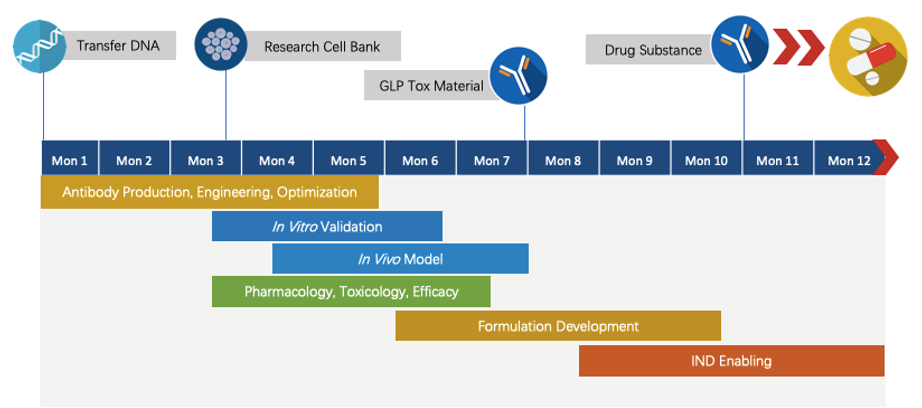This program is to develop therapeutic monoclonal antibody against the novel target – —TIM-3 (T-cell immunoglobulin and mucin domain-3). The highlight feature of this program is the powerful therapeutic target – —immune checkpoint TIM-3. With this, we believe this will be a promising program in current bio-pharmaceutical market.
T-cell Immunoglobulin and Mucin Domain-3(TIM-3)
In past few years, immunotherapies have made significant progress on treating malignant tumors. Immune
checkpoint blocking drugs are able to pose notable anti-tumor outcomes on receptors like anti-cytotoxic
T-lymphocyte-associated protein-4 (anti-CTLA-4) and anti-programmed cell death protein-1 (anti-PD-1). TIM-3
is another key immune checkpoint receptor, and we believe that anti-TIM3 might be next promising therapy for
cancer immunotherapy.
Here are highlight features of TIM-3.
-
TIM-3 is expressed in various T cells, and is a favorable target in cancer immunotherapy;
-
TIM-3 plays an important role in the initiation of cell-mediated anti-tumor immunity;
-
TIM-3 has been reported to improve the health outcomes of patients with cancer immunotherapy in an
increasing number of preclinical studies;
-
TIM-3 is generally recognized as a negative modulator of anti-tumor immunity;
-
TIM-3 is an ideal target for next-generation cancer immunotherapy;
-
TIM-3 can be used in combination with current anti-CTLA4 and/or anti-PD-1 therapies to treat cancers.
 Fig.1 Mechanism of action for TIM-3 signaling.1
Fig.1 Mechanism of action for TIM-3 signaling.1
Published Data
An increasing number of preclinical studies and clinical studies have indicated that TIM-3 can be a potential target to treat cancer and potentially, has promising anti-tumor efficacy. All the data mentioned below provide athe rationale for therapeutic function of TIM-3 in various cancers. Hence, our program is to develop a therapeutic monoclonal antibody that inhibitsinhibit TIM-3 and suppressessuppress tumor progression in the specific tumor of interests.
• TIM-3 mediates the regulation response of innate and adaptive immunity.
• TIM-3 plays a dual role in proinflammatory and anti-inflammatory tumor microenvironments.
• TIM-3 is upregulated by tumor antigen specific CD8+ T cells and CD8+ tumor
infiltrating cells.
 Fig.2 TIM-3 is upregulated by tumor antigen specific CD8+ T cells and CD8+ tumor infiltrating cells.5
Fig.2 TIM-3 is upregulated by tumor antigen specific CD8+ T cells and CD8+ tumor infiltrating cells.5
• Administration of anti-TIM-3 monoclonal antibody enhances cytokine production by improving tumor antigen
specific T cells and T cell proliferation.
 Fig.3 Administration of anti-TIM-3 monoclonal antibody enhances cytokine production.7
Fig.3 Administration of anti-TIM-3 monoclonal antibody enhances cytokine production.7
• Increased number of TIM-3 expressed by cancer cell is associated with tumor progression and poor survival
times.
TIM-3 is known to be produced by different types of cancer cells, such as sarcoma, gastric, myeloid leukemia,
cervical and osteosarcoma etc.
• Preclinical studies show therapeutic potential of anti-TIM-3 and other checkpoint inhibitor combination.
Indications
Anti-TIM-3 monoclonal antibodies and their anti-tumor efficacy have been tested in a number of tumor cellsAnti-TIM-3 monoclonal antibody has been tested in many tumor cells and their anti-tumor efficacy. Is supported. Some indications include but are notnot limited to: colon carcinoma, sarcoma, colon adenocarcinoma, prostate tumor, myeloid leukemia, cervical cancer, pulmonary cancer, and osteosarcoma etc. If you are interested in Anti-TIM-3 and its role in other indications, please reach out to our scientists for further communications.
Clinical Trials under Progress
• Several ongoing clinical trials includeis including anti-TIM-3 monoclonal antibodies, such as MBG453 and TSR-022. The efficacy and other data of MBG453 is being evaluated as a single agent and/or in combination with PD-1 monoclonal antibody. TSR-022 is currently evaluated as a single agent but will continue tomove on to test the efficacy and safety readouts in combination with anti-PD-1 mAbs in several tumor types.
Creative Biolabs is looking for potential partners to gain collaboration opportunities to develop anti-TIM-3 antibody program. We offer global strategiesprovide global strategic and trusted partnerships with our partners all over the world. Guided by our advanced business strategies, we are dedicated to making drug discovery and development programs the most effective through a collection of efforts. Our rich experience and streamlined management structure enable us to successfully develop the therapeutic product candidate in immuno-oncology field. We believe our Next-IO™ programs will surely be accelerated by combining our skills and expertise.
If you are interested in our programs (not limited to TIM-3, but also other targets you are interested),
please feel free to contact us for more details.



 Fig.1 Mechanism of action for TIM-3 signaling.1
Fig.1 Mechanism of action for TIM-3 signaling.1
 Fig.2 TIM-3 is upregulated by tumor antigen specific CD8+ T cells and CD8+ tumor infiltrating cells.5
Fig.2 TIM-3 is upregulated by tumor antigen specific CD8+ T cells and CD8+ tumor infiltrating cells.5
 Fig.3 Administration of anti-TIM-3 monoclonal antibody enhances cytokine production.7
Fig.3 Administration of anti-TIM-3 monoclonal antibody enhances cytokine production.7

 Fig.4 The timeline of Next-IO™ programs.
Fig.4 The timeline of Next-IO™ programs.

 Download our brochure
Download our brochure